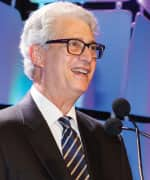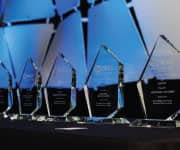Life Extension Magazine®

This winter, a group of the world’s leading stem-cell researchers, ethicists, and visionaries gathered in Miami to talk about a change that could disrupt human life as profoundly as the invention of the combustion engine, antibiotics, or the personal computer. The event was the World Stem Cell Summit, and the group assembled included luminaries such as Life Extension® advisory board member Dr. Aubrey de Grey and researchers representing top universities, national health agencies, and industry.
In this exclusive interview with Life Extension, Bernard Siegel, founder of the World Stem Cell Summit and executive director of the Regenerative Medicine Foundation, shares some findings from the Summit and explains how the early controversy over stem-cell research actually helped fuel the revolution.
What you need to know
Advances in medical technology have increased exponentially in recent years. Conferences such as the World Stem Cell Summit, held by Dr. Bernard Siegel, attract a range of experts from all over the world to share their findings from the vast amount of research that is taking place. Dr. Siegel shares some of the technologies he’s excited about in this interview.
LE: Thank you for joining us today. One of the remarkable things about the World Stem Cell Summit is the range of experts you attract from all over the world. Many of these experts believe that stem-cell research will one day be instrumental in defeating diseases that are common today and even in extending human lifespan. Where is stem-cell technology today, and where do you think we’re heading?
BS: When I got involved in stem-cell research in 2002, it was all about embryonic stem cells. Embryonic stem cells were perceived as a potential cure for every disease, and the idea that they could be transformed into any cell in the human body was viewed as an elixir. When Dr. Michael West, who founded the revolutionary company Geron (and was the first scientist to isolate human embryonic stem cells for regenerative medicine), first saw embryonic stem cells, he thought it was like nuclear fusion. But it was all very controversial at the time, with some groups of people very opposed to their use, and it attracted a lot of attention. There was a very contentious debate over their use. Looking back, I think that public debate was very important to where we are today. It created a giant demand among the public for these kinds of therapies. What came out of that controversy was a consumer movement where individuals saw stem cells as a potential cure for themselves, their family, and friends. That background is very important to understanding where we are today. Now we’re not just talking about embryonic stem cells, but about the convergence of multiple technologies into a new field called regenerative medicine.
LE: What technologies do you mean?

BS: We’re living on the cusp of a scientific and biomedical revolution that will change our lives, our children’s lives and medicine. But the public hasn’t really picked up on it yet. Society isn’t really ready for this. It’s the convergence of technologies beyond stem-cell research, like robotics, nanotechnology, big data. They’ve all exploded onto the scene at the same time. When I started this conference, we weren’t able to reprogram cells. Now we can take a stem cell derived from bone marrow and reprogram it to an embryonic state. We have genetic engineering tools that allow us to snip out parts of the gene and reprogram it. The implications are astonishing, and not just for diseases. Aging will also be affected. The human life is going to extend.
LE: It’s true that human lifespan increased dramatically over the last century, but the rate of increase has slowed, and in very recent years, has even regressed. When do you think we’ll start to see the practical effects of this technological revolution?
BS: Some of these technologies are already in the here and now. If you have access to healthcare and you live in the United States, you might already be lucky enough to have an extended lifespan. But in terms of major advances, I think it’s hard to predict right now what the breakthrough will look like and when it will come. A black swan event is an unpredictable event, so it’s very hard to know when we will have a black swan event. But I can confidently predict we will have one, and it will have a good effect. Imagine if we find a cure for something like diabetes…it’ll stun the world.
LE: What are some of the disease targets researchers are going after?
BS: You can go into any disease and find folks who are interested in attacking that disease. Cell regeneration has emerged as a major focus. We had sessions on immunotherapies for cancer. And you can’t underestimate the potential for CRISPR technology to snip out bad code from the DNA and insert good code. What if we could cure genetic diseases in the embryo stage? I’m talking about diseases like Tay-Sachs. Tinkering with the human genome could change the way our species evolves.
LE: It makes sense that diseases based on simpler genetic defects would be the first targets, but what about the most costly and complicated diseases like Alzheimer’s and heart disease? Genetics play a role there, but there’s much more involved in the disease process.
BS: That’s very true, and heart disease in particular is a challenging one. The father of mesenchymal stem cells (which are derived from various tissues in the adult and can differentiate into different types of cells) is here from Case Western University. There’s an excellent clinical trial at the University of Miami using mesenchymal stem cells to help victims of cardiac disease. We’re seeing incredible results, but there’s a lot of work left to do in the cardiac field. It’s not the easiest disease to attack.
LE: What are some of the other technologies you’re excited about?

BS: A few years ago, I went to a conference on regrowing organs. Dr. Anthony Atala from Wake Forest was there, and he’s a co-chair at this year’s Summit. Dr. Atala’s specialty is bioprinting, bio inks, and creating scaffolds to grow new organs. It’s very futuristic, the ability to grow new organs from a few cells. When you have people like Dr. Atala and the U.S. Military working toward the same goals alongside major donors, it’s a sure thing that we’ll see major leaps forward. One of the projects we’re working on is setting up a database of regenerative cell outcomes to foster collaboration. There currently isn’t anything like that.
LE: It’s safe to say the government has historically been hostile to rapid medical progress. Do you see hope this will be any different?
BS: Right now, the head of the Food and Drug Administration understands regenerative medicine. They are working very hard to reach out to companies that are making breakthroughs. But the public needs to get involved to push this forward. That’s why the embryonic stem-cell debate was a net positive. It started as a political issue. If your view is that cells are a person and it’s against your moral beliefs to use them in research, it’s hard to advance. And there were many people who believed that and had objections to the research. But if you believe that those cells would be discarded, it becomes a moral imperative to use them. The debate was contentious, but it has subsided now that we have reprogrammed cells from adult cells. The question is no longer if we should move forward with this research. The question going forward will be how to get the benefits of regenerative medicine down into the public. Imagine if we have a cell therapy that can heal your joints, but it’s expensive so your insurance isn’t going to pay for it. Medicare won’t pay for it. The public will need to move this forward through sheer demand.
LE: This kind of research is extremely expensive. Where is the funding coming from right now, and who stands to benefit?
BS: That’s a fascinating question, actually. The early companies like Geron were like gold miners looking for gold. In those days, it was the pick and shovel companies that did well, companies like General Electric or companies that sold assay equipment. But going forward, I think the companies that have the broadest vision have the most potential. There is a lot of potential out there, and a lot of vested interests. Google’s company, Calico, has a multimillion-dollar investment aimed at aging. We know there’s gold in them thar hills, but we don’t know which company will survive.
About the World Stem Cell Summit
The World Stem Cell Summit was launched in 2003 by the nonprofit Regenerative Medicine Foundation, where Bernard Siegel is a founder and director. The goal of the summit is to bring together leaders in the field of regenerative medicine, including research scientists, ethicists, representatives from government and industry, businesses, and sources of funding.
The 2018 program featured speakers from every corner of regenerative medicine, with breakouts on immunotherapy, government oversight and regulation, tissue engineering, investment patterns, and other areas of focus that can help push the field of regenerative medicine forward.
For more information on the Regenerative Medicine Foundation, visit https://www.regmedfoundation.org
For more information on the World Stem Cell Summit, visit http://www.worldstemcellsummit.com
A native of Richmond, Virginia, Dr. Bernard Siegel founded the Genetics Policy Institute (now the Regenerative Medicine Foundation). He is committed to advocacy work on behalf of patients, doctors, and researchers in the regenerative medicine community. He is a recognized policy expert on stem-cell research, regenerative medicine and cloning.
If you have any questions on the scientific content of this article, please call a Life Extension® Wellness Specialist at 1-866-864-3027.

